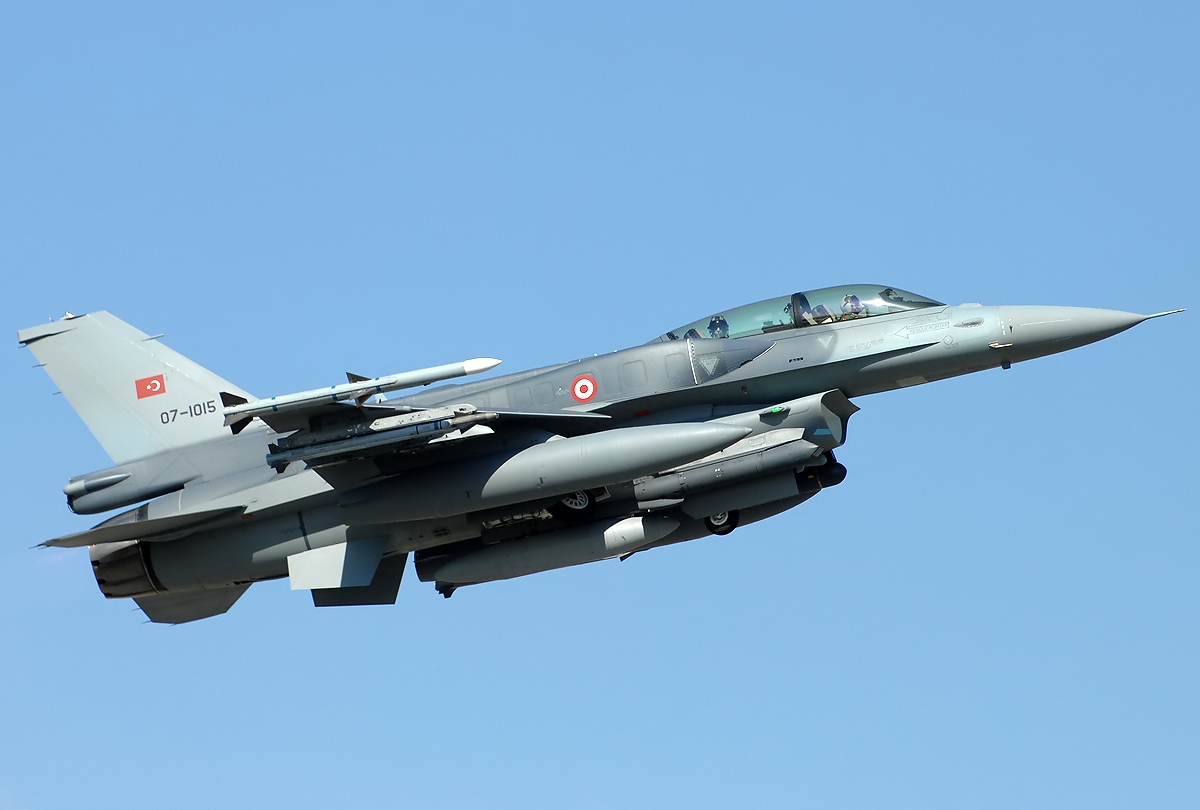An Edinburgh factory run by an Italian arms multinational makes laser technology for the type of warplanes used by Turkey against the Kurds in Syria.
F16 fighters were used by the Turkish military to bomb the city of Afrin in north east Syria recently, an offensive described by critics as “ethnic cleansing”.
The arms giant Leonardo produces technology for F16 fighter jets in Edinburgh. The Ferret revealed in October 2017 that it had been given £6 million by Scottish Enterprise, prompting concerns over the use of taxpayers’ money.
The company received the money from the publicly-funded business support agency despite being the ninth largest arms multinational in the world, with sales worth nearly £7 billion in 2015.
Leonardo’s products include military helicopters, fighter jets, drones, missiles, naval guns, artillery and armoured combat vehicles. It has produced laser targeting systems in Edinburgh for Turkey’s F16s.
Critics of the Afrin bombing have slammed Leonardo’s arming of Turkey and accused both the Scottish and UK governments of “complicity” in Turkey’s war on the Kurds, a new front in war-torn Syria.
Reports have detailed the company’s manufacturing of the laser systems in Scotland.
“It’s a Leonardo product made and designed in Edinburgh,” an executive told Defence Turkey magazine. “We build 50 lasers a month in Edinburgh for the F16, F18, F35 for the target pods. We know how to build pointed trackers. We’re world-leading.”
Turkey launched an offensive in January 2018 against Afrin in north east Syria, where the Kurdish militia is based. It claims the militia, the YPG, is a terrorist group with links to PKK, a banned group fighting for Kurdish autonomy inside Turkey.
In 2013 and 2014, Selex, a company merged into Leonardo, applied for export licences to Turkey covering countermeasures designed to destroy missiles before they hit targets.
Critics of the arms trade have called for a suspension of UK sales to Turkey. They accused the Scottish Government of hypocrisy for questioning Britain’s involvement in the recent missile strikes on Syrian chemical weapon plants while allowing taxpayers’ money to support companies selling arms into the war zone.
After the UK strikes on Syria, First Minister Nicola Sturgeon challenged Prime Minister Theresa May’s decision, saying: “The question that the PM has not answered is how this action, taken without parliamentary approval, will halt their use or bring long-term peace.”
But Ross Greer MSP, external affairs spokesperson for the Scottish Greens, said: “While the UK government never hesitates to sell arms to the world’s most brutal regimes, the Scottish Government never cease to declare their moral superiority. Yet again this has been exposed as a sham.”
Andrew Smith of Campaign Against Arms Trade added: “By arming Turkish forces the UK has made itself complicit in the destruction they have brought to Afrin.”
A spokesperson for the Kurdistan Solidarity Campaign said: “Those being killed in Afrin, not just Kurds but British citizens, are being killed with weapons produced around the world, with the assent of the international community.”
Leonardo became operational last year. It brought together AgustaWestland, DRS Technologies UK, Finmeccanica UK and Selex ES under one name. The factory in Edinburgh was previously called Selex ES Ltd until the corporate makeover.
The Scottish Government stressed that support for the company helped diversification into non-military markets. “Support ranges from innovation and efficiency improvements, research and development support, to skills training for staff,” a spokesperson said.
“We recognise the important role that aerospace, defence and marine engineering sectors play in Scotland’s economy, and our aim is to create an environment in which sectors can continue to grow and prosper, particularly through diversification.”
The government spokesperson added: “Scottish Enterprise has supported Leonardo in Edinburgh to diversify into non-military markets. This includes supporting Leonardo to target commercial opportunities in homeland security, blue-light and civilian markets.”
Scottish Enterprise said it supported businesses across Scotland. “All aerospace, defence and marine projects supported by Scottish Enterprise show significant economic impact in return for funding, particularly in the safeguarding and creation of new jobs,” added a spokesperson.
Leonardo confirmed that lasers for F16 target pods, used to designate targets, are produced at its Edinburgh factory. “We do supply lasers into target pods which are then sold by our customers for F16s which, I think, does include Turkey,” said a company spokesperson.
Regarding applications for export licences by Selex ES, he added: “I can’t go into exact details of what those are but I can say that we don’t supply missiles, grenades or bombs to Turkey. When you apply for that export licence that’s just the category, it doesn’t mean you’re applying to sell that particular product. So, under that, for example, we don’t actually make any of those things except for countermeasures.”
Photo thanks to Aldo Bidini, GFDL 1.2, via Wikimedia Commons. A version of this story was published by The Sunday Post on 22 April 2018.














